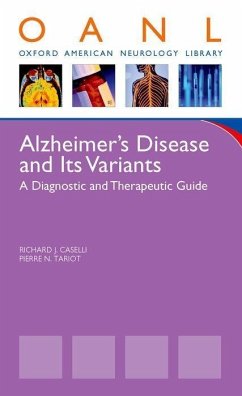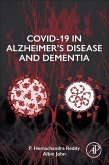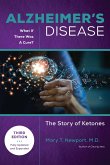Richard Caselli, Pierre Tariot
Alzheimer's Disease and Other Dementias
A Clinician's Guide to Diagnosis and Management
Richard Caselli, Pierre Tariot
Alzheimer's Disease and Other Dementias
A Clinician's Guide to Diagnosis and Management
- Broschiertes Buch
- Merkliste
- Auf die Merkliste
- Bewerten Bewerten
- Teilen
- Produkt teilen
- Produkterinnerung
- Produkterinnerung
This volume begins with a discusion of how to produce an effective diagnosis through a series of precise, easy- to- follow steps. Additional sections detail the current research state of each of the major individual dementia diseases that the general clinician frequently encounters. The last section procides a clinically focused 'how to' guide for treatment including symptom-directed pharmacotherapy, as well as an up-to-date summary of ongoing major therapeutic trials and an assessment non-pharmacological management issues such as driving and end-of- life considerations.
Andere Kunden interessierten sich auch für
![Covid-19 in Alzheimer's Disease and Dementia Covid-19 in Alzheimer's Disease and Dementia]() P Hemachandra ReddyCovid-19 in Alzheimer's Disease and Dementia119,99 €
P Hemachandra ReddyCovid-19 in Alzheimer's Disease and Dementia119,99 €![Alzheimer's Disease: What If There Was a Cure (3rd Edition) Alzheimer's Disease: What If There Was a Cure (3rd Edition)]() Mary T. NewportAlzheimer's Disease: What If There Was a Cure (3rd Edition)22,99 €
Mary T. NewportAlzheimer's Disease: What If There Was a Cure (3rd Edition)22,99 €![Disease and Social Diversity Disease and Social Diversity]() Stephen J KunitzDisease and Social Diversity51,99 €
Stephen J KunitzDisease and Social Diversity51,99 €![Surgical Pain Management Surgical Pain Management]() Surgical Pain Management223,99 €
Surgical Pain Management223,99 €![Orthopaedic Emergencies Orthopaedic Emergencies]() Casey J HumbyrdOrthopaedic Emergencies101,99 €
Casey J HumbyrdOrthopaedic Emergencies101,99 €![Mayo Clinic Infectious Diseases Case Review Mayo Clinic Infectious Diseases Case Review]() Larry M BaddourMayo Clinic Infectious Diseases Case Review84,99 €
Larry M BaddourMayo Clinic Infectious Diseases Case Review84,99 €![Mayo Clinic General Surgery Mayo Clinic General Surgery]() Jad M AbdelsattarMayo Clinic General Surgery172,99 €
Jad M AbdelsattarMayo Clinic General Surgery172,99 €-
-
-
This volume begins with a discusion of how to produce an effective diagnosis through a series of precise, easy- to- follow steps. Additional sections detail the current research state of each of the major individual dementia diseases that the general clinician frequently encounters. The last section procides a clinically focused 'how to' guide for treatment including symptom-directed pharmacotherapy, as well as an up-to-date summary of ongoing major therapeutic trials and an assessment non-pharmacological management issues such as driving and end-of- life considerations.
Produktdetails
- Produktdetails
- Verlag: Sydney University Press
- Seitenzahl: 264
- Erscheinungstermin: 28. Mai 2010
- Englisch
- Abmessung: 203mm x 127mm x 14mm
- Gewicht: 263g
- ISBN-13: 9780195393385
- ISBN-10: 0195393384
- Artikelnr.: 29609189
- Verlag: Sydney University Press
- Seitenzahl: 264
- Erscheinungstermin: 28. Mai 2010
- Englisch
- Abmessung: 203mm x 127mm x 14mm
- Gewicht: 263g
- ISBN-13: 9780195393385
- ISBN-10: 0195393384
- Artikelnr.: 29609189
Richard J. Caselli, M.D. is Professor and Chair, Department of Neurology, Mayo Clinic in Arizona and member of the Mayo Clinic Arizona Executive Board. He is also Clinical Core Director of the Arizona Alzheimer's Disease Center which comprises the six major academic tertiary care medical centers in Maricopa and Pima Counties. He is a graduate of Columbia College, and Columbia College of Physicians and Surgeons. He pursued his Neurology training at the Mayo Clinic in Rochester, Minnesota and received the Woltman Award for outstanding clinical performance during his training. He completed a fellowship in Behavioral Neurology and Cognitive Neuroscience with Dr. Antonio Damasio at the University of Iowa (1987-1988) after which he joined the staff of the Mayo Clinic (Rochester, Minnesota subsequently transferring in 1990 to Scottsdale, Arizona where he has been since). He served on the Board of Directors of the Alzheimer's Association Desert Southwest Chapter and on the Medical and Scientific Affairs Advisory Committee of the Chapter (1993-1999). His clinical specialty is Behavioral Neurology, particularly regarding Alzheimer's disease and related cognitive disorders in adults and was Division Chair of Behavioral Neurology at the Mayo Clinic from 1995-2000. His research centers on cognitive changes related to aging and Alzheimer's disease and is supported by grants from the National Institute on Aging, the Arizona Alzheimer's Disease Research consortium, and the Mayo Foundation through the support of private benefactors. He has written over 120 medical and scientific articles, book chapters, and reviews on topics related to dementia including a novel scheme for clinical recognition and diagnosis of dementia syndromes and a symptom-oriented approach to dem entia treatment. He has received the Teacher of the Year Award (Medical Specialties) in three consecutive years (1995-1998), and the Lifetime Educator Award (2007). In 1999 he received the Mayo Clinic Arizona Distinguished Clinician Award, and in 2002 the Distinguished Investigator Award. He has served on the Adult Neurology Recertification Examination Committee of the American Board of Psychiatry and Neurology (1999-2007), and is a current author of the Dementia section of the Medical Knowledge Self-Assessment Program for Internal Medicine. Pierre N. Tariot, M.D. is a Phi Beta Kappa graduate of Amherst College who attended the University of Rochester School of Medicine and Dentistry. He completed residencies in Internal Medicine and Psychiatry at the University of Wisconsin in Madison, Wisconsin, and is Board Certified in both specialties, with added qualifications in geriatr ics. He served as a Medical Staff Fellow and then Senior Staff Fellow at the Intramural Research Program of the National Institute of Mental Health. In 1986, he joined the faculty of the University of Rochester Medical Center, achieving the rank of Professor of Psychiatry, Medicine, Neurology, and Aging and Developmental Biology. He served as Director of the Memory Disorders Clinic, Director of Psychiatry at monroe Commnity Hospital, and Director of the University of Rochester component of the Alzheimer's disease Cooperative Study, funded by the National Institute on Aging. Since 2006, he has served as Director of the Banner Alzheimer's Institute Memory Disorders Center and Associate Director of the Institute. He has an appointment as Research Professor of Psychiatry at the University Of Arizona College Of Medicine. He is a Fellow of the Gerontological Society of America, a Distinguished Fellow of the American Psychiatric Association, and a member of the American College of Neuropsychopharmacology. Dr. Tariot has investigated, and lectured extensively on, multiple aspects of diagnosis and therapy for dementia and Alzheimer's disease, and recognition and management of behavioral disturbances in dementia. He has published over 240 papers on these topics. He served as the Chair of the Behavioral Pathology Committee of the National Institute on Aging's Consortium to Establish a Registry for Alzheimer's Disease. He has earned several awards for his research, including the American Geriatrics Society New Investigator Award for Neuroscience, an NIMH Geriatric Mental Health Academic Award, 2005 UCLA Turken Award, and Fellowship in the Gerontological Society of America. Dr. Tariot's research affiliations include the National Institute of Mental Health, th e New York State Department of Health, Arizona Department of Health, the National Institute on Aging, the Institute for Mental Health Research, and the Alzheimer's Association.








